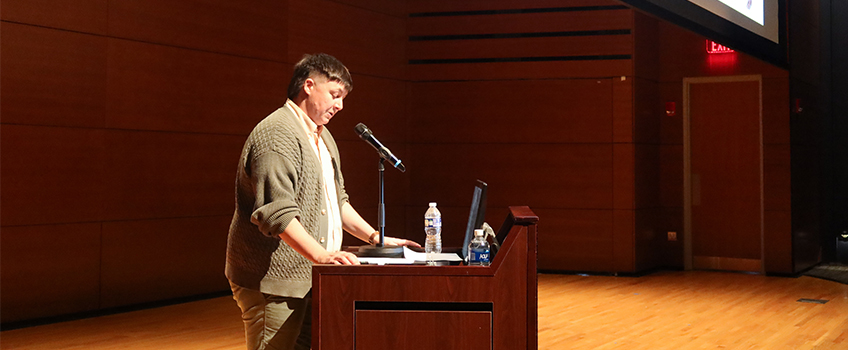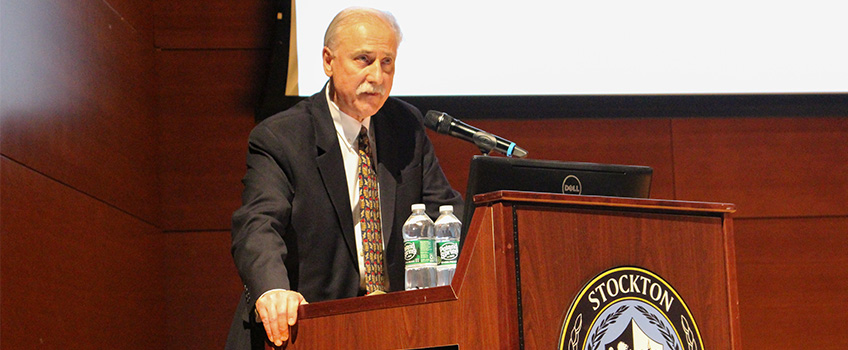Annual Talk Explores Gender, Race in Colonial America

Yale professor Greta LaFleur is the 14th speaker for the annual Paul Lyons Memorial Lecture. LaFleur presented their research on colonial America on Wednesday, April 11.
Galloway, N.J. — There are niche topics within colonial American studies and gender & sexuality studies. However, few are quite as shocking as the subject of this year’s Paul Lyons Memorial Lecture.
Greta LaFleur, an associate professor and director of Graduate Studies for the American Studies program at Yale University, analyzed how castration was used as both gender affirmation and capital punishment as part of the Wednesday, April 12 lecture in the Campus Center Theatre.
They began the conversation by providing context for their research, specifically exploring the history of gender, sexuality, race and science.
In researching historical documents and materials for their upcoming book, LaFleur found local newspaper clippings and periodicals that either sensationalized self-castrations of men in colonial Connecticut or described criminal cases of enslaved Black men who were either forcibly or voluntarily castrated in lieu of being executed during criminal trials.
“My major claim today is that these complex and very different archives surrounding 18th-century castrations, both willed and unwilled, have something to teach us about emergent understandings of the relationship between gendered presentation and physical embodiment,” LaFleur said.
The materials they have aptly titled “The Colonial Castration Archive” demonstrate how the people of the past perceived sex and gender through physical expression. For LaFleur, this examination of history provides a nuanced approach to learning and understanding the history of transgender people and gender affirmation through physical alterations.
“This is a complicated, hard-to-look-at bind for those who would seek out untainted histories of trans life or trans experience, or even redeemable histories of gender,” LaFleur concluded. “As my book explores, just as the shadow side of white freedom is racial violence, so too is the shadow side of racialized sexual violence, white gendered freedom. The benefit of focusing on this earlier period, before the disciplining and professionalization of the human sciences, is that it gives us a clearer sense of the domains that fed the later emergence of this set of ideas.”
For 14 years, Stockton University’s Master of American Studies program has hosted lectures in memory of the late Paul Lyons, a faculty member of the School of Social & Behavioral Sciences.
Lyons, as described by Distinguished Professor of Social Work & Africana Studies Pat Reid-Merritt, was a man who was constantly on the quest to learn and explore. She reminisced on his activeness and involvement on campus and his commitment to advocating for marginalized people and communities, no matter what program he was in.
“We clicked right away, and we used to joke about our friendship – Paul would sometimes describe himself as ‘the white Jewish boy from Newark,’ and I would always add, ‘that always thought that he could do anything and everything,’” Reid-Merritt shared. “While he was in General Studies, he developed courses like ‘The 1960s,’ where he talked about the struggle for civil rights and the efforts by so many people from different groups who wanted to end the forms of prejudice and discrimination that existed in America. … Before he passed, he called me and told me that he wanted to develop a course in Africana Studies, and I said, ‘Sure you are – you’re Paul Lyons.'”
Just a year after his death in 2009, the lecture series was created in his name and has since hosted 14 guest lecturers and scholars from the humanities and social sciences.
Author Discusses the Legacy of White Supremacy in Education
March 30, 2023

Galloway, N.J. — “Today is so much a product of yesterday that yesterday can only be understood as it is explained by today… For the present is simply the developing past, the past is the undeveloped present.”
Donald Yacovone, the guest lecturer for the 13th annual Paul Lyons Memorial Lecture, began his presentation with a quote by American historian Frederick Jackson Turner on March 28 in the Campus Center Theatre.
Yacovone is a lifetime fellow for the Hutchins Center for African American Research located at Harvard University. He is also a winner (along with Henry Louis Gates, Jr.) of the NAACP’s 2014 Image Award for their six-part documentary series, “The African-Americans: Many Rivers to Cross.”
His talk was adapted from his book, “Teaching White Supremacy: America’s Democratic Ordeal and the Forging of Our National Identity,” which has been nominated for a 2022 Los Angeles Times Book Prize in History.
– Story by Loukaia Taylor
– Photos by Lizzie Nealis


